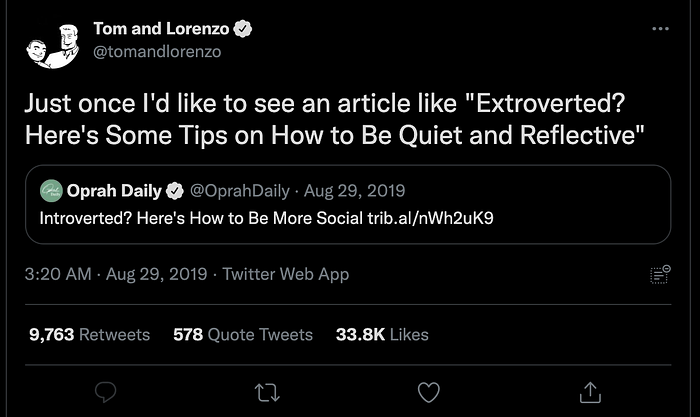It seems like the world is obsessed with introverts. We want to understand them, laugh about them, and even try to change them. As an extrovert who has mostly dated introverted people I’ve laughed at the memes about introverts being relieved when people cancel plans, had my heart melt at comics about how loved introverts feel when people lovingly give them space, and even marveled at how my partners can feel totally depleted after a party when I feel fully energized.
In April 2019, Tom and Lorenzo responded to a tweet by Oprah that featured an article titled “Introverted? Here’s how to be more social”. He asked a simple question, “Where are the articles titled: Extroverted? Here’s some tips on How to be more Quiet and Reflective.”

https://twitter.com/tomandlorenzo/status/1167004120756236291
And he makes a good point. For the first twenty years of my life I was a passionate, outgoing, extrovert known for arguing any point that crossed my path and interrupting people to say “actually . . . “ and share my knowledge on a given subject.
But in my late twenties I moved into and lived at a Zen monastery for two years and what I learned there about being quiet and reflective changed my life. Sure introverts are interesting for their sometimes counterintuitive behavior, but what’s really unexamined is the strange thing that drives extroverts to talk and how changing it can help you in all sorts of ways.
Extroverts who learn self control around speaking and connecting . . .
- Appear more confident and powerful
- Have people listen to them more closely
- Experience greater satisfaction and depth in life
- Have stronger and more intimate relationships
- Appreciate the small things in life more
- And take fewer things personally
One thing most extroverts don’t understand is that . . .
Talking a lot isn’t always a sign of confidence, it might actually be camouflage for your insecurity.
When I lived at the monastery we spent a lot of time not talking. And at first this was really challenging. I noticed how often I wanted to make a comment, a joke, or offer an interesting fact about something that was happening.
But because silence was encouraged I learned how to bite my tongue and I discovered how deeply uncomfortable I was.
If I wasn’t talking, sharing my insights, making a joke then who was I?
Was I valuable as a person? Would people want me around?
I came to see that while I do love connecting with people my desire to talk and connect wasn’t coming from a deep commitment to connection, but an anxious yearning to have the people around me constantly reassuring me that I was funny, smart, and charming.
And when I let that go I had to face the reality that I wasn’t very confident at all, I was just addicted to the constant stream of feedback I got by being extroverted.
You see, many extroverts love to connect. They get energy from being around people, from loud noises, and exciting activities, but they sometimes struggle to be with themselves.
The silence can feel confronting, their own energy can be hard to contain, and so they go through life hooked on this social feedback. Slowly by being silent I learned to let go of this need and found that I could enjoy other people even more.
Because they were no longer a dealer for my social dopamine high, but rather actually really interesting people with whom I could connect and deepen relationships.
This leads me to the second thing I noticed:
The key to more connection isn’t more conversation, it’s more silence.
One of the biggest complaints I’ve heard from friends about the dates they go on is that the person just talked about themselves the whole time.
It’s a mistake that can be understood by our current culture of producing content. Our job is to share, share, share and hope that someone will respond. This puts our attention on talking and sharing and not much on listening.
None of the platforms most of us spend much time on really encourage us to listen or engage. It’s why so many of my coaching clients are blown away by how much I simply listen to them.
When you’re quiet there’s more space for things to arise.
Practice talking less and notice what arises in you
If you want to actually connect with more people, be quiet and notice what arises.
When you’re listening are you really listening? or are you waiting for your turn to talk?
Can you slow down and pause before speaking?
Did you really hear what that person just said? Or do you already have something lined up?
What do you feel when you hold your comments?
What do you feel when you talk less?
By slowing down and talking less you can learn a lot about yourself and even find a way to be fully comfortable without having to talk all the time.